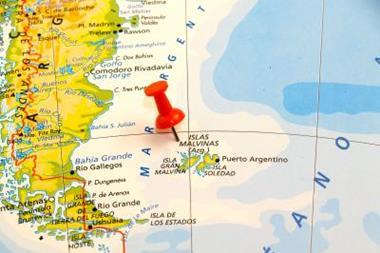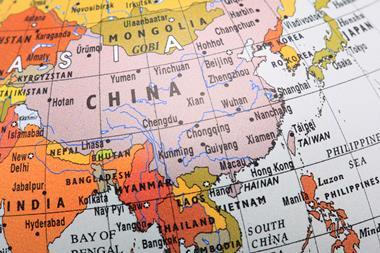Drilling in the Falklands has sparked tensions and a populist decree poses confiscation risks to oil firms and cargo vessels
The UK's decision to drill for oil off the Falkland Islands has received strong objections from Argentina and this poses operational risks for oil firms and cargo vessels in the region, according to forecasts.
Since Argentina’s military capabilities are thin it is more likely to exert diplomatic and legal pressure on Britain and other foreign companies to try and deter them from doing business in the Falklands, over which it claims sovereignty and that could be resting on as much as 60bn barrels of oil.
Argentina’s military force has been significantly reduced since its defeat in the 1982 Falklands War. This means the potential for military action is low, assessed Exclusive Analysis. However, Argentina is already making life difficult for oil companies conducting exploration in the Falkland Islands, which are known as the Islas Malvinas to the Argentines.
Efforts to disrupt operations began in February when Argentina detained the Thor Leader cargo ship, suspected of transporting drilling equipment to UK oil companies in the Falklands.
A decree from Argentine President Cristina Fernandez stated that ships transiting Argentine waters en route to the Falkland Islands must obtain a permit. The foreign minister said Argentina aimed to make it “difficult and costly” for oil explorers in the islands.
The populist move could be aimed at distracting attention from Fernandez’s mounting domestic problems, which include recent protests by Argentine farmers. Her popularity has plummeted to 20%, key members of her inner circle are facing corruption allegations, and her government has lost its majority control of Congress.
The decree poses confiscation risks not only for vessels that stop at Argentine ports on route to the Falkland Islands but also to oil companies with interest in Argentina, and which are also involved in joint ventures to explore for oil in the islands, noted a report by Exclusive Analysis.
Despite these risks the lure of oil profit has encouraged UK-based Desire Petroleum to start drilling this week in the North Falkland basin.
Desire's rig, the Ocean Guardian, is expected to be leased to other companies doing exploration in the area, among them are UK-based Rockhopper and Falklands Oil and Gas, as well as Australia's BHP Billiton.
Refuelling, in particular, could be a problem for these companies, although they reckon on using Brazilian ports and Britain's Tristan da Cunha islands, which are relatively close to the Falklands.
Extraction of oil in the Falklands Islands was previously considered too expensive because of the difficult and isolated conditions in which the drillers have to operate.
Exclusive Analysis predicted that the confiscation risks will continue in the run up to the presidential elections in October 2011, but will only continue in the event that Fernandez or her husband, former President Nestor Kirchner, are elected president.
Following the Falklands war relations improved between Argentina and the UK in the 1990s.
Nevertheless, Kirchner and Fernandez have a history of adopting a tough stance against the UK. Following Kirchner’s election in 2003 he forbid charter flights between Argentina and the Falklands and banned UK oil and fishing companies from also operating in Argentina.
There have also been several incidents of fishing vessels operating in disputed waters being temporarily seized by Argentina and warning shots have sometimes been fired, said Exclusive Analysis.
As polls stand now the Mayor of Buenos Aires, Mauricio Macri, leads the presidential race.




















No comments yet